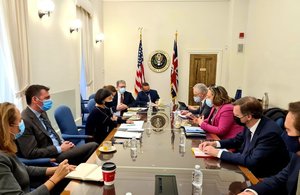Good morning all, I am Julia Lopez, Minister for Media, Data & Digital Infrastructure at the Department for Digital, Culture, Media and Sport. I’d like to thank the ASA for asking me to be a speaker at this morning’s event.
Since I joined the department, I have been rapidly building my understanding of the breadth of my portfolio and the numerous different industries that play such an important role in our social fabric. I am looking forward to working with this sector as it plays a central role in a wide range of topical debates, from online harms to childhood obesity.
The global success of the UK advertising industry and its position within a competitive landscape is something to be admired. This trajectory needs to continue and I’m committed to working to secure this, where the Government can help.
We have a plethora of creative geniuses sitting right across the UK and contributing to some of the most memorable, evocative and successful campaigns in advertising history.
The benefits of advertising are undeniable. Over the last 18 months, and to this day, we have witnessed first hand the lifeline advertising has provided for colleagues in Government to communicate vital public health messaging to the whole of the UK public. For that, I would like to extend my thanks to the industry for their expertise and guidance.
I am impressed with the advertising industry’s strength and resilience over the course of the pandemic. The speed at which the industry has recovered is incredible. It is a testament to the hard work that I know many of you have put in over recent months and years.
There is no doubt in my mind that this industry is not just surviving, but it is absolutely thriving.
In the UK we are fortunate to boast a leading self-regulatory approach to online advertising, with the ASA and CAP at the forefront. Their forward-looking attitude and efforts to develop standards as trends emerge in the sector places us head and shoulders above the rest.
Their call for evidence on body image is testament to this commitment to evolving at pace whilst developing high standards for advertising in the UK.
Colleagues in ASA and CAP are amazingly proactive, and I want to ensure that in my role as Minister for this sector, we work collaboratively and I support where I can.
The advertising landscape is dynamic, and it is increasingly becoming more focused on digital channels. This brings significant benefits to businesses, but as we know it also brings new risks of consumer harms and brand safety.
As part of this, it is my goal to help the industry adapt and grapple with the challenges that this transition creates.
The public are rightly calling on players across the online advertising ecosystem – from advertisers to publishers, and all those in between – to tackle the harms created. We have a responsibility to stay on the pulse of what is harmful to our young and vulnerable people, as well as society generally.
Regulating advertising, and the internet, can be challenging because of the speed with which it changes. It’s an area that has grown exponentially over the last decade and more.
Over half of all advertising spend is now online – but the regulatory framework, which up until now has centred on advertisers, has not kept pace.
Increasingly, we are focussed on some core harms, including issues such as fraudulent advertising, scam ads and the role of advertising in body image.
I am sure all of us are familiar with the stories of those affected, whether psychologically or financially. These are issues I consistently hear significant concerns about – from the public, from consumer groups, and from businesses. This is not something we can sit on for any longer, we have to take action.
This Government is working to develop the Online Advertising Programme, a broad, fundamental review of the regulatory framework. I am planning to launch the consultation for this policy shortly.
Guided by the principles set out in the Plan for Digital Regulation, our overarching goal for the programme is to improve trust in online advertising by reducing the harms advertising online can create.
This will have benefits for business – improving trust in online advertising means the reputation of legitimate advertisers should not be damaged by those who do not play by the rules. In addition to this, increasing trust will promote growth and drive innovation as investors and creators will feel more confident in the market.
Ultimately, the Government is committed to ensuring there is a regulatory framework which reduces harm, incentivises compliance and can quickly enforce remedial action.
We know you share this objective. The ASA’s work on new Online Platform and Network Standards demonstrates a willingness to take on these new challenges.
So we are committed to considering how we can build on the existing regulatory framework. We want to review and strengthen the mechanisms currently in place and those you are developing to equip our regulators to meet the challenges of the online sphere.

